UNDP/AGRA catalytic grants have proven benefits for farming cooperatives in the groundnut value chain in Malawi
19 May 2023
An agri-food value chain is a set of linked activities that work to create an agricultural product from start to finish. For RFS projects, adopting an agri-food value chain approach means designing and implementing interventions that address constraints and challenges that exist within specific links of an agricultural production system—from input suppliers to end markets.
Smallholder farmers in RFS countries primarily produce agricultural products for household consumption or operate within informal ‘short’ agri-food value chains that supply their local community. Smallholder farmers often sell crops, livestock, and other raw materials, either directly or through middlemen, to small local stores or markets. These markets are characterised by low value products, low prices, and low and inconsistent returns for farmers.
For those smallholder farmers who only produce for household consumption, gaining entry into either informal or formal agri-food value chains has the potential to significantly increase incomes and provide opportunities for growth. For smallholder farmers already operating within informal value chains, entry into formal agri-food value chains can provide exposure to new markets, opportunities to pivot to higher value crops, skills upgrading and greater income security.
One of the most significant barriers to agri-food value chain development, and improvement in smallholder incomes, is access to end markets. The lack of smallholder participation in markets is caused by a number of challenges: inability to supply consistent products; lack of road infrastructure, transport, and storage; lack of access to credit and technologies; and lack of commercial information, contracting and coordination.
The RFS programme is focused on developing sustainable food value chains within country projects. This approach combines the concept of value chains with sustainable development criteria, ensuring that value chain development is (a) economically sustainable; (b) socially sustainable; and (c) environmentally sustainable.
By applying a sustainable value chain approach to RFS project design and implementation, country project teams are able to analyse food production systems within their project sites, identify weak links within food value chains and design targeted interventions that will remove constraints so that the value chain can develop. Target interventions may include improving seed quality, establishing producer organisations, constructing storage facilities, facilitating communication with markets and establishing platforms for private sector engagement.
The ultimate aim of these interventions is to introduce, develop or expand value chains that are inclusive of smallholder farmers, connect rural communities with larger markets, improve household incomes and are sustainable in the long-term.
Value chain and market access interventions encompass a wide variety of activities. Within the RFS programme, the main objective of the value chain approach is to analyse the entire food value chain, identify constraints within the value chain, and design and implement multilateral interventions to address those constraints so that the value chain can develop and provide improved, sustainable income for smallholder farmers.
Many RFS country projects teams are tailoring this approach to their specific country context. In Eswatini, the RFS country project team has identified potential value chains with existing, but untapped markets to support and promote, including poultry and beekeeping. In Senegal, UNIDO and IFAD have targeted six agro-value chains for intervention with the goal of decreasing post-harvest losses, promoting energy efficiency and managing natural resources. In Nigeria, the RFS project is developing interstate value chains in key food commodities (cassava, maize, rice, and sorghum) through the establishment of public-private partnerships.
Explore the RFS Country Projects to see more examples of how RFS countries are implementing Value Chain & Market Access activities.
Stories from the Field
Explore our stories from the field to learn more about how RFS country project teams are implementing activities related to the programmatic theme of Value Chains & Market Access.
Relevant resources
We have a growing library of reports, briefs, case studies, media, tools and guidelines. Explore all resources related to Value Chains & Market Access to get greater insight into our programme activities.
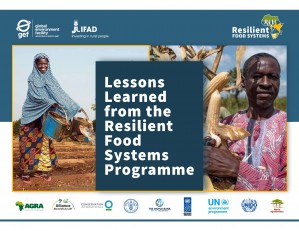
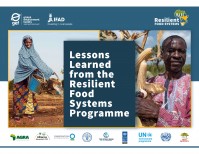
Integrated Approach Pilot (IAP) programmes were conceived as part of the Global Environment Facility (GEF) 2020 Strategy to test the delivery of integrated approaches that address discrete, timebound, complex, global environmental challenges. In its Sixth Replenishment Cycle (GEF6), three IAPs were funded: Sustainable Cities, Taking Deforestation out of Commodity Supply Chains, and Fostering Sustainability and Resilience for Food Security in Sub-Saharan Africa, also known as the Resilient Food Systems (RFS) programme.
The RFS programme serves as an outstanding example of different partners and countries with distinct mandates joining forces to pursue a shared objective, leveraging their respective strengths to transform food systems in Africa. It highlights the significance of clearly articulating the programme’s vision, establishing a well-defined division of labour, and delineating roles and responsibilities from the outset, forming the foundation for an accountability framework. Moreover, the RFS underscores the importance of adopting a nexus approach that integrates food security, agriculture, environment, socio-economic, and climate considerations.
This holistic approach recognizes the interconnectedness of these sectors and the need for holistic solutions. The RFS’s systems-based approach brings together multiple partners at different levels and fosters information flows in both directions, supporting collaboration and knowledge sharing.
This publication presents some of the main lessons learned from the RFS programme, which lasted for six years between 2017 and 2023. It provides a reflection on the implementation, lessons learned, and observations around the key components of the RFS. The programmatic value-add of the RFS and the manner with which it was harnessed during implementation is conveyed through case studies drawn from the experience of the country projects across these components.
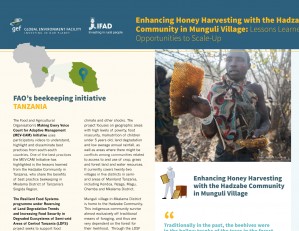
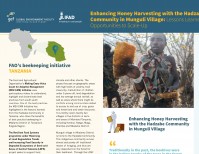
The Food and Agricultural Organisation’s Making Every Voice Count for Adaptive Management (MEV-CAM) Initiative uses participatory videos to understand, highlight and disseminate best practices from south-south countries. One of the best practices the MEV-CAM Initiative has highlighted is the lessons learned from the Hadzabe Community in Tanzania, who share the benefits of best practice beekeeping in the Mkalama District of Tanzania’s Singida Region.
The Resilient Food Systems programme under the Reversing of Land Degradation Trends and Increasing Food Security in Degraded Ecosystems of Semi-arid Areas of Central Tanzania (LDFS) project seeks to support food production and security in Tanzania. Through the LDSF project, the Hadzabe community have developed a land use and participatory plan of the forest.
This poster presents lessons learned and the process of adopting this best practice beekeeping from the Hadzabe community.
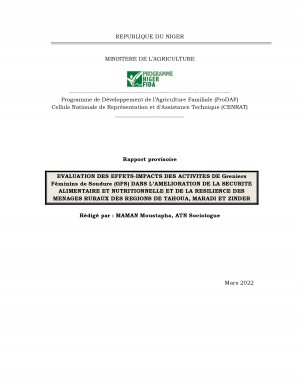
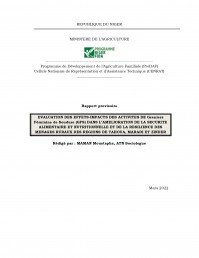
To better understand the impact of Women's Welding Granaries in the RFS project sites, the National Representation and Technical Assistance Unit (CENRAT), and the Family Farming Development Programme (ProDAF) conducted a survey to see what the effects have been on the ground.
In total, the project targets 3669 GFS members (45% in Maradi, 31% in Zinder and 24% in Tahoua) with 8 villages per region practising GFS. 244 women were surveyed in the study, including men’s focus groups in each village to form a holistic impression of the impact.